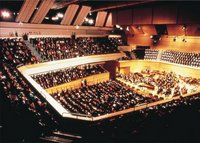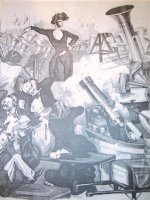Magnus Linklater, writing on page 15 of today’s (13.8.06) Scotland on Sunday, deplores ‘the almost complete absence of any reference (in the SQA’s courses and arrangements) to why the English language and its literature should be read and studied in the first place.’
He goes on that this (the reason why English and its literature should be read and studied) has nothing to do with “effective information in contemporary society,” or “deploying language for political purposes.”
But, Linklater claims, ‘it has everything to do with the rhythm of great prose, with the inspiration of poetry, with the beauty and cadence of a well-written line, and the thrilling images that words, well used (and presumably well chosen) can conjure up.’
He states that, ‘you cannot analyse and learn these things, you have to feel them from the start, to relish the good and to understand what distinguishes it from the mediocre and the bad’. (That) ‘this can only really be done through the old adage – “read, learn, inwardly digest, and preferably recite.”’
To say that I wholeheartedly concur with what Linklater thinks is an understatement; I think and believe that the essence of being able to write well is feeling the rhythm of the language – of instinctively knowing some words and the order in which they appear work well in a text.
The main difficulty with this is that is difficult to prove. Longitudinal studies would have to be undertaken to get anything like conclusive proof that what Linklater claims is indeed the case.
That doesn’t necessarily mean this isn’t true, although it might not be, but just that it has not been irrefutably dealt with in the academic literature where such things are verified and proved.
All that I have to go on is that it feels true for me – for how I feel about my own writing, and why I feel that way.
I do not think it is my formal education that has provided me with this feeling I always have when writing. After all, I have been writing for many more years than I have held my academic qualifications.
I wrote well in Secondary School, before, during and after the tutelage and encouragement of my English teachers, to whom I owe a great deal.
But apart from those wonderful people, I believe I owe much to my liking for the reciting of poetry, and now for language from almost any genre, be it monologue, prose or poetry.
It is in reciting that you come closer to the rhythm of language, and sometimes, to meanings not readily apparent in a silent reading.
The meaning of language – of words, sentences, lines in poetry or dialogue or monologue, for that matter, does not merely rest in the words lying quietly on the page. Rather, the meaning, the connotation, its place in the world, rests with the sound of those words or sentences, those lines of poetry or those lines of dialogue or monologue.








